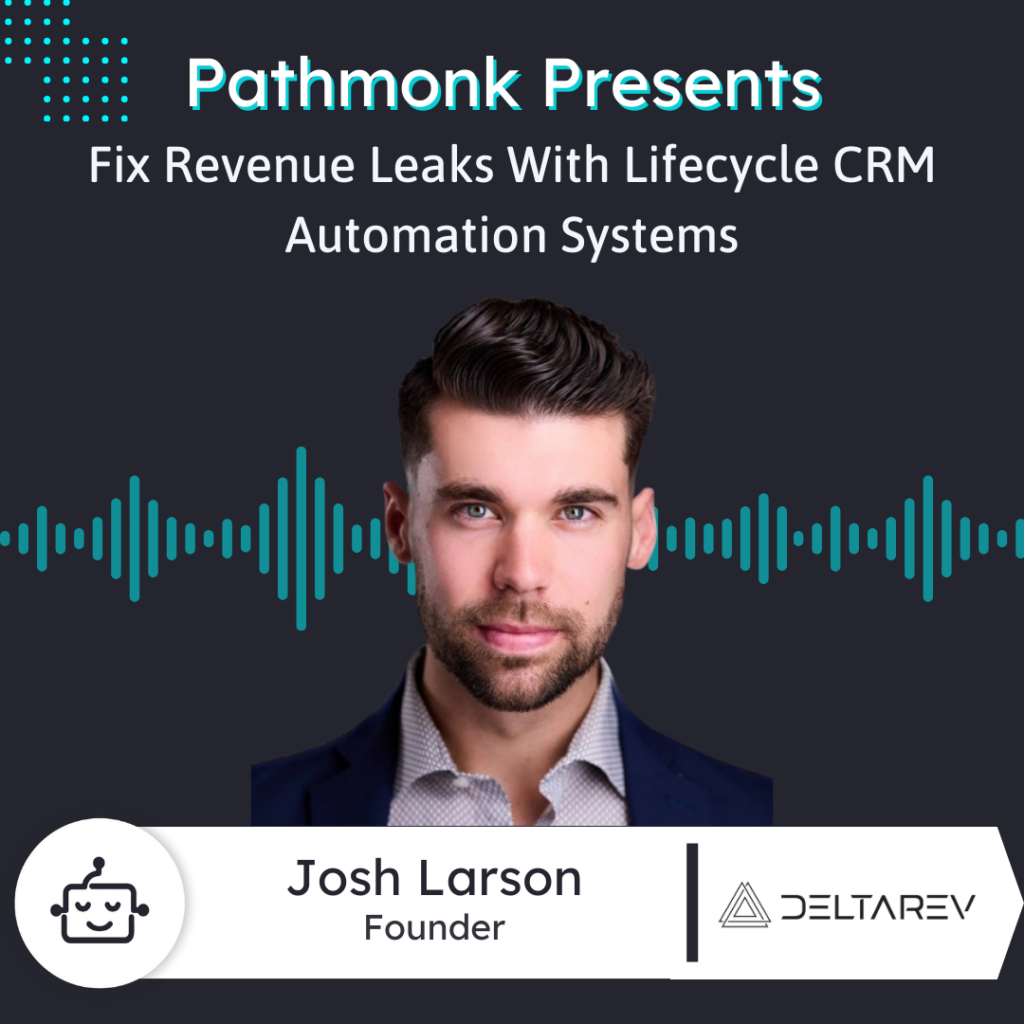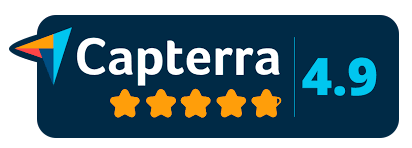
Introduction
Meet Josh Larson, founder of Delta Rev, who helps seven-figure, appointment-based businesses turn their CRMs into full-funnel growth engines.
In this episode, Josh breaks down how to capture every lead “from click to close,” automate follow-up so no prospect is left behind, and nurture longer sales cycles without burning time. You’ll hear how his audit process surfaces “leaks” in your revenue cycle, why organic content plus warm DM conversations convert, and how back-end workflows drive repeat business, higher lifetime value, and even enterprise value.
Expect tangible ideas to cut no-shows, lift conversion rates, and—most importantly—buy back your time to focus on impact, family, and freedom.
Increase +180%
leads
demos
sales
bookings
from your website with AI
Get more conversions from your existing website traffic delivering personalized experiences.

Rick: Pathmonk is the AI website convergence. With increasing online competition, over 98% of website visitors don’t convert. The ability to successfully show your value proposition and support visitors in the buying journey separates you from the competition online. Pathmonk qualifies and converts leads on your website by figuring out where they are in the buying journey and influencing them in key decision moments with relevant micro experiences like case studies, intro videos, and much more. Stay relevant to your visitors and increase convergence by 50% by adding Pathmonk to your website in seconds, letting the AI do all the work and increase convergence while you keep doing marketing as usual. Check us out on Pathmonk.com.
Hey everybody. Welcome to today’s episode of Pathmonk Presents. Today we are joined by Josh Larson. He’s the founder of Delta Rev. Josh, welcome to the show.
Josh Larson: What’s going on Rick? Happy to be here, man.
Rick: Happy to have you, Josh. Listen, I want to just right, deep dive. Like right away. Okay. Let’s talk about Delta Rev a little bit. I know it’s something that you freshly started, but you’ve got a lot of experience that you can share with us today. So in your own words, what’s the heart of what Delta Rev does and how would you describe it to someone new?
Josh Larson: Yeah, Delta Rev is my brainchild from all the different experience I’ve had in the past 15 years working with businesses and looking at their front end. So from a lead coming in the door to that becoming a client, a patient, whatever you call that, the important piece there that seems to always be missed is: how do they go through that? What’s their journey look like? And making sure that when they come through, whether it’s a form fill on the website, it’s an ad that they click on and go through a funnel, that information and data is collected and brought into a central place. Most people use a CRM — that’s like a customer management warehouse where you can just have all that data, contact information stored.
That’s where people stop. What I’ve noticed is when you stop at that point, there’s a lot of opportunity missed out on what a CRM can do throughout the entire revenue cycle. So what I do and what the business does is we come in, we build out that CRM so from click to close, you have full visibility into what is going on, where those leads are coming from, what’s working, what’s not. And the way we set it up is to automate follow-up — so no lead is left behind — and then go ahead and nurture those that may not close. So they’re always warm to you until they either buy or unsubscribe.
But that’s where we don’t stop. Most businesses stop at the first revenue cycle, but Rick, I’m sure you’re aware the second sale’s always the easiest. So we go ahead and also create a backend workflow with the CRM to go ahead and support the customers that you already have, you being able to service them at a higher level — meaning you have increased lifetime value. And then because you have this robust system in place now, your enterprise value increases as well.
Rick: Interesting. So I’m intrigued. What kind of business would need this the most at the moment? You talked about leads and patients, so obviously there’s a hint there of the type of business that you might work with already, or the ideal type of business. But in a sense, I want to understand a little bit more about what’s the core problem that you’re solving for them. Talking about the CRM and how you don’t stop at that — what can people expect when they come to you?
Josh Larson: I love that. So at the core of it, what I do when I work with people and my clients is: one, they’re in a vast array of industries. To answer your first part of the question, most of them are around or above seven figures already. Meaning they have product–market fit. They’ve already proven that their product or service is needed and they have continual growth. And now it’s: hey, we need to figure out how we can put a system in place and productize what we’re doing so we can scale it, bring team members in, and not worry about having to be stuck in the day to day.
So those are usually people that are honestly appointment-based. So we think of wellness centers, functional medicine. You have home service businesses. I haven’t worked with these but I could — like barbershops. They’re appointment-based and people come in and still book appointments. They fall out and lose potential revenue there. So that is the brunt of it — who I work with.
And high level, what you get when you work with me is: one, peace of mind knowing what’s actually going on and driving revenue into your business. A lot of people may throw money at marketing and think more leads is actually what they need. In reality, you have a CRM full of a gold mine of leads that you can use and actually close instead of just forget about them as they come in.
A lot of people I work with have the mindset that when someone comes in, they’re a hot lead and they should close right there. When in reality, when somebody first comes in, that’s a warm lead in my mind. And they still need to know who you are. There still needs to be a conversation, a relationship developed so they feel comfortable. They have the trust that you’re gonna take care of them with whatever their problem may be. And that’s what the system does — it helps curate that relationship however long that sales cycle is.
That’s the big thing there. But then we also look at reducing no-shows, increasing your conversion rate, and then increasing lifetime value. But the big thing that’s still in the minutia, but the biggest thing that we want to do with the people we work with is give owners and founders their time back. They started a business not to have an expensive job — they started a business to have freedom, build wealth, and provide for their family. And a lot of these people get stuck in the day-to-day, 60, 70 hour weeks because the systems just aren’t there to support their growth. So the biggest goal with my business is to bring that system to play so they can get their time back. Because let’s be honest, if they’re making that big of an impact in their community, they deserve the time back.
Rick: That’s awesome. I really love how you ended that on that note, because obviously we can geek out on systems and ways to automate things and that’s amazing. I love it. I could spend hours talking about it and I’m sure many of our listeners are into it too. But at the end of the day, what do you do it for? Okay, you might love spending time doing it, but at the same time, that’s your job, right?
The business owner’s job is to worry about service. It’s a plethora of things they need to worry about inside of their job and their business, but also outside of it. And so buying that time back will allow them to actually maybe slow down for a second, be able to think more clearly, and be able to make more of an impact at work and at home. I just wanted to make a note that I love it. I absolutely love it. So that’s great.
Perfect. Now, how do these people typically find out about you? And, I guess in a way, what are your top acquisition channels at the moment? I suppose — I’m just assuming here — maybe social media is one of them. How do you get people in so that they can see the value of working with Delta Rev?
Josh Larson: Yeah, great question. What I do currently — and this is phase one of the go-to-market — is it’s very content right now. I believe that social media is one avenue. I think the second avenue is a website that gives you the ability to showcase know, like, and trust before anybody talks to you, which is going to be key to building that relationship that I talked about. So if you don’t have that, it’s very hard to go from a cold ad to close. Or from any cold source, it’s very hard to close. So I’ve been focused very much on that organic piece — getting content out, showing my knowledge and expertise in what I do. And then when people engage, I go to the DMs and just start a conversation, have a warm conversation to see if there is something I can do to help. If not, maybe there’s something I can do to refer them to. If they need a lead-generation service, I have people that I can refer them to, etc.
So that’s my primary right now. And then working on an ad campaign — so I’ll be bringing them in through cold means. And then my favorite part is getting the website up. That is going to take me a little bit longer than what I want. Obviously that’s a huge piece into what the brand looks like, the authority that you’re going to be creating. So that’ll be the third piece to the go-to-market.
So super excited about what we have going on right now, but everything is organic and driven through organic conversation.
Rick: Nice. So you phased that out. Obviously you have a bit of a roadmap there, right? And the website is coming up and, exactly. That’s awesome because we’re all about websites here at Pathmonk — that’s what we help people with. We help making more conversions from the website. We’ll be looking forward to seeing when it’s up.
Awesome. At the same time, do you have anything, a way for the listeners of Pathmonk Presents to maybe take a peek behind the scenes of how a system would work? Anything that — you said you’re focusing on content — is there anything out there that maybe they can look at? A blog post or something like that?
Josh Larson: Yeah, definitely. So when I work with clients, I do what’s called an audit. So I look at their systems and look at how it’s set up. And really the way I look at it is: what are they leaving on the table? So what revenue potential is sitting in your CRM? So as I mentioned, a lot of people think that the ads are what they need, but in reality, if you look at it: when you pour more water into a bucket that’s leaky, you’re just leaking more cash out.
So I have this tool called my revenue calculator, where it walks my potential clients through where the leaks could be in their current revenue cycle — so in their CRM or their sales process. And then it actually puts a number on it. So you could go through this and see that you have a potential of $50,000 sitting in your CRM that you weren’t aware of, and it’s going to show you where it is. It’s going to show you how to fix that, and what area of your CRM or revenue cycle is the highest priority right now to start to tackle. So if you’re getting leads in but nobody’s following up, it’s going to flag that as the most important thing.
Now, if your listeners do want to see and check that calculator out, they can go ahead and go to my Instagram — it’s at josh dot a Larson — and they can just DM me “calculator” and it will send it to them right away and they can go ahead and start to use that and dive into it.
Rick: Oh, love that freebie there. Amazing. Thanks for that.
Josh Larson: Yes, of course.
Rick: Okay, so Josh, let’s talk about you as a leader. I want to switch gears for a second. I want to talk about you founding Delta Rev. And just want to understand a little bit about your typical day to day because I’m sure many of our listeners will relate in terms of the things you focus on — lead gen side of things, the sales, the closing, whatever it may be. What does a day in your life look like at the moment?
Josh Larson: Such a good question. Leading up to starting this, I struggled for years to prioritize and not be as reactive in my day to day. So before, I was always like: I waited on a Slack, I waited on an email to move and figure things out. Although I had projects, it was like Slack or email would always take priority. And what I found out was that was a very reactive way of working — or a very reactive way of being a leader — and it doesn’t necessarily move the ball forward. It’s just keeping things where they’re at and making sure nothing breaks. So a little bit different nuance there.
So what I’ve actually done is — and I actually invite everybody who is a leader, an executive, a business owner — to audit their time for two weeks and really see where they’re spending their time, and if that’s driving revenue, if that’s driving your energy. Because I was drained at the end of the day. I don’t know about you, but there’s days where if you’re reactive, it’s just draining.
So I just identified that and I was able to then see and block out my entire week. So like Mondays and Tuesdays — if you think about it, business owners are coming back, they don’t want to check emails, nothing like that. They just want to focus on making sure their business continues to run for the week. So Monday, Tuesday, I’m just doing client work, client meetings, getting things ready to go. And then Wednesday, Thursday, Friday, it is lead generation. It is sales calls. And it is following up so I can close those deals.
Yeah, that’s pretty much my week in a nutshell. Nice. I like to be proactive with it, which is very helpful. And it gives you, as we were talking before, the headspace to be able to think critically and really work on the business while you’re also in it.
Rick: I like the focus on a few things. I like that you mentioned energy. I think energy management trumps time management every day, all day. So it’s knowing what your pockets are. And it sounds like from batching to contextualizing, avoiding context-switch as much as possible, you’re putting your head in it. You’re able to get in that flow, in that productive state where you’re able to actually churn out content and then speak to people and have the energy to do a podcast — things like that. It’s something important. So I love to hear that focus.
Now, there’s so much information out there, and I’m sure there’s something dedicated to learning in your schedule, right? But there’s so much info. There’s like a flood of content. How do you cut through the noise? And where do you go to stay sharp and up to date with industry trends or anything that’s relevant to your field?
Josh Larson: Yeah. So in terms of business thought leadership and stuff like that, I turn to — really what I do first — I turn to podcasts or YouTube and I just sort through. And what I look at is: do they have the results that they’re talking about? So if I look at, let’s say, an Alex Hormozi versus someone that’s maybe 22, 23 who just started a marketing agency, I’m going to look at that in a way of: okay, their experience, their results — do they speak to where I want to go first of all? If they do — great. Who are they learning from? Because if they’re getting that success and they’re not just bringing that up and figuring it out on their own, they’re learning. So who are their mentors? What books are they reading? What podcasts are they listening to? Who are they following on Instagram and YouTube?
So I do a deep dive there, and then I just start chunking down and start reading, start diving. And honestly, once you find the right people, you’ll know. Like you’ll read the books and you’ll be like “Oh, this makes sense. They have results, they’ve helped these many people,” and you can really get down to the nitty gritty that way and get out of the noise.
That’s kinda how I do it. Because there is a lot of noise and it does take more work than some might want to do, but it’s so worth it when you actually find those mentors, those coaches that you can — and I’m not saying you have to go work for them or with them. I’m talking like: dive into their content, consume what they know, because they’ve already taken those 10,000+ hours and consolidated it into something that you can just steal their knowledge.
Rick: That’s pretty smart. It is like, in a way, you’re getting into their inner circle — quote-unquote “inner circle.” Right? You try to understand: okay, where did they get their info from? Let me skip, cut through the noise, and go there specifically and see where they’re learning from, how they think, that kind of thing. That’s pretty smart.
Now let’s keep it on that note. Josh, as we wrap things up — we’re on the back half of our episode here — we typically have a rapid-fire segment of questions. It’s just a few kind of light and engaging questions that we throw at you. The only spoken rule is that it’s sharp, concise answers. Is that okay?
Josh Larson: Perfect. I love it. Let’s do it.
Rick: Cool. What’s the type of content you prefer most? Do you prefer watching, reading, or listening?
Josh Larson: Ooh, I prefer watching for sure.
Rick: Okay, so what’s the latest piece of content — and it could be a YouTube video or a course, whatever it is — that you picked up? And were there any gems or ideas that really stuck with you in it?
Josh Larson: Yes. I’ve taken a social media course and the biggest gem that stuck to me was: use social media as a conversion tool. Like I talked about before — have a conversation in the DMs.
Rick: Okay, that’s a good one. This, I think, you might like because you’re the systems guy. So if you had a magic wand and could fix one frustrating thing in your marketing life with tech, what would it be?
Josh Larson: Ooh, one thing that I could fix with tech… that it would never break. I think people think that technology is gonna be the savior, but sometimes it breaks. One, I hope it never breaks. Two, if it does, you’re warned right away versus having to try to figure out what the problem is.
Rick: Okay. That’s a good one. Then what’s one repetitive task that you’d love to put on autopilot forever?
Josh Larson: I would love to put on autopilot forever either writing my emails or follow-up. Follow-up is important, but man, if I don’t write it down or put it in my reminders, I totally forget about it.
Rick: Yeah, that’s a good one. I think you’d be surprised at how many people mention email. There’s gotta be something out there, right? Someone is probably gonna be plotting your inbox at some point — you know, someone with a startup for that. But please do invent it because we definitely need help.
Now, if you could go back and give your past self a quick pep talk at the start of your journey, what kind of advice would you drop?
Josh Larson: So good. The advice I would drop is: never give up on yourself and have 100% belief and 100% clarity on what you want. And always just go after it.
Rick: Nice. Sounds like you need to have vision and then resilience.
Josh Larson: 100%. Yeah, exactly.
Rick: Nice. Love the message. Josh, thanks a lot for being on the show with us today. I want to give you the last word as we wrap things up. If someone forgets everything about the interview today — everything we talked about — what’s the one thing that they should remember about the work you are doing with Delta Rev?
Josh Larson: Love that. The one thing I love people to take away is to just remember that although systems aren’t necessarily sexy or fun, systems are what are going to buy back your time and allow you to continue to make that impact, get your freedom, build your wealth, and provide for your family.
Rick: What a way to close. Josh, I want to thank you again for being with us today. And if anyone wants to check your services out and check out Delta Rev, where could they go and get in touch with you?
Josh Larson: Yeah, the best place right now is my Instagram — at josh dot a dot Larson. I’ll be having content there that they can check out, and then as the website and everything comes live, that’ll all be pushed to Instagram as well. So that would be the best place to check out in the interim.
Rick: Amazing. And for that freebie that you mentioned earlier, what should people DM you?
Josh Larson: Calculator.
Rick: Calculator. Amazing. I want to see that. Awesome. Thanks Josh.
Josh Larson: Thank you again. You bet. And I wish you a wonderful day.
Rick: Thanks Rick. You as well. Appreciate it.
Alright, bye everyone.











